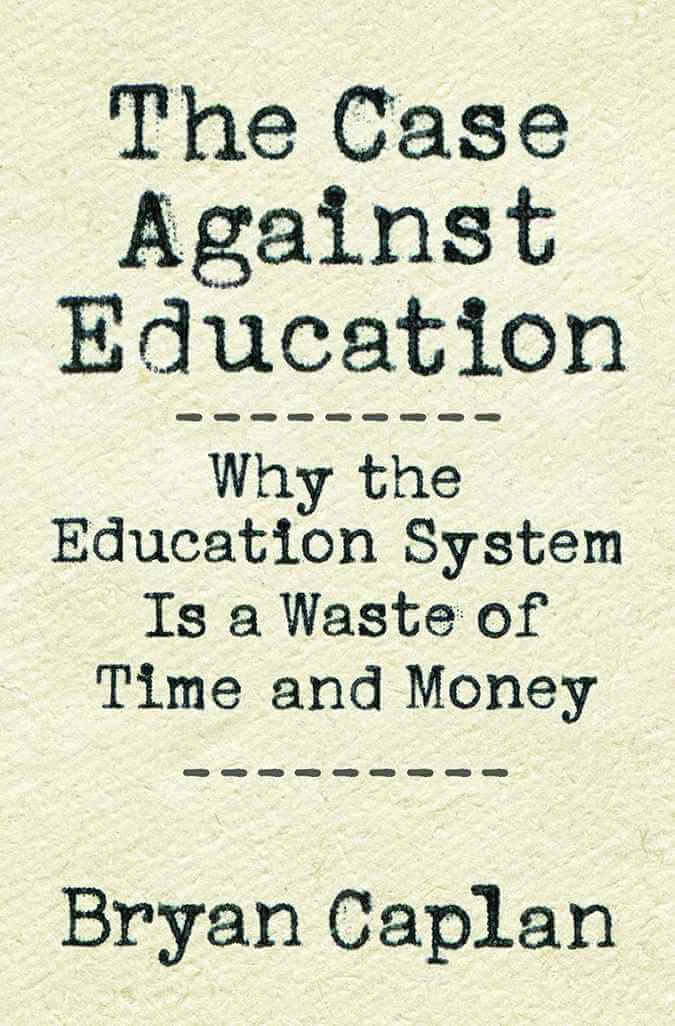At the heart of our culture is the idea that “school pays.” Indeed it does: for every year of school completed after 8th grade, the average student earns about 10% more as an adult, according to economist Bryan Caplan.
Yet this statistic hides a startling fact: graduation years are worth far more than any other.
In terms of future earnings, the fourth year of high school pays more than all other years combined. The final year of college is worth twice as much as freshman, sophomore, and junior years combined.
How could this be? If every year of school taught valuable skills, then wouldn’t a student who dropped out after his third year of of high school capture three-quarters of the financial rewards of high school graduate? Wouldn’t a college student who stopped going after sophomore year gain half the rewards of a college graduate? Yet in reality, each gains only a tiny fraction.
This is what economists call the “sheepskin effect”: the financial premium that diplomas confer in the marketplace. (Diplomas used to be printed on sheepskin, hence the name.)
The sheepskin effect is more than just an interesting statistical oddity: It reveals a major flaw in the way that most people think about education, as well as one of main obstacles that nonconventional learners face in the job market.
I learned about the sheepskin effect from Caplan’s new book, The Case Against Education: Why the Education System is a Waste of Time and Money (Princeton University Press, 2018). In this article I summarize the most interesting parts of Caplan’s book, share their implications for less-credentialed learners—such as those without high school or college diplomas—and offer advice for transitioning into the job market. This article, by the way, is the first in a series called “The Self-Directed Bookworm”, where I read fascinating books related to Self-Directed Education and share what I discover.
Skills vs. Signaling
Bryan Caplan is an economics professor and homeschooling dad, and he packed his book with research, data, and statistical arguments that are often hard to follow. But with patience, the serious reader can grasp its central argument, which is this:
Most formal education is about showing off—a.k.a. “signaling”—not building actual skills. After learning basic reading, writing, and arithmetic, the majority of schooling is functionally useless to the majority of students. You don’t go to school to gain skills, you do it to signal your intelligence, diligence, and conformity to future employers.
When a high school student asks “When will I ever use this literature, algebra, or history in real life?”, Caplan says: you probably won’t! But without those classes—or more accurately, the diploma that signals your willingness to complete those classes despite their irrelevance—you’ll face worse job prospects and earn much less money in the future.
Like it or not, Caplan reminds us, most employers love graduates from fancy colleges more than graduates from unknown public colleges. High school graduates are more likely to get hired and get paid more than high school dropouts. And he’s right—there’s no point debating the numbers. Diplomas equal dollars. (Note to readers: I use the word “diploma” synonymously with “degree”. I also sometimes use the word “education” synonymously with “school”, not because I believe it, but because Caplan does in the book.)
But why do businesses care so much about diplomas? According to Caplan, the two possible answers are skills and signaling.
We go to school to learn stuff, right? This is the “human capital” view of education, which almost everyone believes. Schools teach skills, so more school equals more skills. That’s why businesses like highly schooled people.
But businesses also care about your productivity, work ethic, teamwork, tolerance for boredom, and sheer ability to conform. This is what economists call signaling.
Signaling matters because businesses don’t have the time or money to deeply assess every job applicant. They need a quick way to find out if you’re someone who shows up, tries hard, plays well with others, dresses appropriately, speaks appropriately, and won’t start a revolution. All the skills in the world don’t mean much if you’re an unproductive, disruptive, or antisocial worker. This is why a degree from a top college opens so many career doors: it’s essentially a giant sign flashing the message “Hire me! I’ll do anything you ask!”
Consider this: Would you rather have a Princeton education without the degree, or a Princeton degree without the education?
When I asked my Facebook network this question (which I borrowed from Caplan’s book), I received a surprising number of responses from self-directed young adults who voted for the degree rather than the education. It was evident that even nonconventional learners grasped the economic power of signaling: while a Princeton education might be fascinating, a Princeton degree opens serious doors that someone without a college degree simply couldn’t open. “Take the degree and then go educate yourself elsewhere,” many argued. Can you really argue with their logic?
Signaling clearly exists, and its power is real. But how much of school is really about skill-building, and how much is about signaling?

Why Schools Don’t Build Skills
Why do so many high school or college students rejoice when a teacher cancels class? Why do they adore teachers who give “easy ‘A’s”? Why do they copy, cheat, and do as little work as possible?
In other words: If employers rewards skills, shouldn’t students be sad when they miss a chance to build more skills? Especially college students, who are attending school by choice? These realities don’t make sense if school is mostly about skill-building—but they make perfect sense if school is mostly about signaling.
Caplan makes a dazzling array of numbers-based arguments against the idea that schools build meaningful skills. Consider that:
- Most high school and college courses are genuinely irrelevant to most people’s jobs.
- Adults retain shockingly little of the literacy, numeracy, civics, science, and foreign language they acquire in school.
- General reasoning abilities—a.k.a., one’s “mental muscles” or “critical thinking skills”—only budge a tiny amount thanks to schooling.
- While schooling does increase measured IQ, the results are largely temporary.
- While schooling does give you a social network, most of your fellow students will probably never be in a position to help you get a job. Outside of some very specific situations (i.e. going to Stanford for Computer Science), lucrative networking usually begins after you start working in your field.
- The only proven way to build relevant job skills is by doing that job—ideally in a deliberate practice situation. (For a quick introduction to deliberate practice, read this chapter from my book The Art of Self-Directed Learning.)
After devastating the “schools build skills” position, Caplan makes his case for the power of signaling by forcing us to consider a few uncomfortable questions:
Why are graduation years worth so much more than any other year? Only signaling can explain the sheepskin effect. Otherwise you could do all four years of college, choose to walk away without a diploma, and still reap the financial benefits.
Why do bartenders, cashiers, cooks, janitors, and security guards earn significantly more when they possess any kind of diploma—despite the fact that high school and college teach virtually none of the skills required for these jobs. Because employers value the work ethic signaled by a diploma.
If one year of schooling raises personal income by around 10%, then why does the national income of a developing country only get a 1-3% boost from more schooling? Because diplomas don’t make the economic pie bigger, they just redistribute it. That’s why “credential inflation” exists, and it can only be explained by signaling.
In Caplan’s ultimate estimation, education’s financial reward is a shocking 80% signaling and 20% skills. (He admits that the final numbers are fuzzy and may sometimes be less extreme; but he firmly believes that signaling takes the lion’s share.)
For parents, educators, and young people who find themselves arguing against the idea that schools teach meaningful skills, Caplan’s argument is a power booster—but it also leaves them with an unsettling conclusion. If signaling is so real and powerful, then how can self-directed learners afford to ignore it?

The Problem of Self-Directed Signaling
One big question that homeschoolers, unschoolers, alternative schoolers, and those skipping college must ask themselves is: Am I shooting myself in the foot, economically speaking, by not focusing on diplomas?
Caplan emphasizes that a diploma signals a package of socially desirable traits—intelligence, conscientiousness, and conformity—and proposes that employers are wary of those with only a partial signal, because they suggest offsetting weaknesses. He explains:
Suppose you scored well on the SAT but never went to college. Employers will readily believe that you’re smart. But if you’re so smart, why didn’t you go to college? As long as you’re conscientiousness and conformity were in the normal range, finishing college would have been a snap. Once employers see your SATs, they naturally infer you’re below average in conscientiousness and conformity. The higher your scores, the more suspicious your missing diploma becomes.
Want to show your intelligence by blogging about science fiction? It will only make you appear to have “issues,” according to Caplan. Want to prove your work ethic in some idiosyncratic way, like copying the dictionary by hand? Then employers will assume that you should have been able to handle four years of academic drudgery—and why didn’t you? Telling an employer that you’re “self-taught” or a graduate of a brand-new Internet university? The further outside the box you go, Caplan says, the more it backfires on you. Most employers want the package deal.
This might seem hypocritical coming from a dad who dedicated this book to his two homeschooled sons—but not when you realized that they only homeschooled for middle school, because employers don’t pay attention to middle school. They later returned to high school, most likely to signal conformity to future employers.1
I believe Caplan paints a cynical picture about employers willingness to consider alternative credentials, but let’s imagine that he’s correct for a moment. What can a self-directed young person without a high school diploma—the most lucrative credential to obtain, by the numbers—do to minimize the damage done by sending the “high school dropout” signal?
Go to college anyway. Caplan thinks that going to college requires finishing high school. As homeschoolers have known for decades and as I’ve written elsewhere, it doesn’t. Every nonconventional student I know who has wanted to attend college has done so with little struggle. In the U.S., the community college system provides an excellent bridge from nonconventional secondary education to conventional higher education.
Focus on career fields that prize skills over signaling. Silicon Valley is famous for embracing any young person who’s an amazing coder, even if they lack social skills. Actors, writers, performers, and artists can enter competitive job markets on the merit of their creations. Freelancers and the self-employed face few gatekeepers beyond the quality of their work (licensing restrictions aside). Even in more traditional fields, a strong referral can bypass the need for a standard credential.
Supplement your self-direction with employment. If the ability to conform and work diligently are so important, then you can signal these traits by getting a few jobs as a teenager while simultaneously pursuing self-directed learning. References from previous employers are valuable signals. And sure enough, this is what many self-directed teens already do: take internships, volunteer positions, and employed work, proving that they can hang with the normies.
What about those without a four-year college degree? In Better Than College, I shared the stories of how self-directed young people can create their own powerful signals to rival the college diploma. I also conceded that certain jobs in government, banking, science, health, education, and other bureaucratic fields may never accept nonconventional credentials: a college diploma may be the only way in. The right answer for any individual young person is almost always, “It depends.”
Yes, signaling matters. No, self-directed learners can’t get any job they want just by showing off their skills. Yet I still believe that Caplan paints an overly pessimistic picture of self-directed signaling. Nonconformist young people tend to seek employment in nonconformist fields in the first place—and if not, they can always go to college and jump through the hoops necessary to pursue their dream job. Like all things in life, taking an alternative path simply requires a bit more time and creativity. Despite the undeniable power of diplomas, the heavens do not automatically fall for those who don’t receive our society’s hallowed credentials.
The Case Against Education School

For practitioners of Self-Directed Education, Caplan’s explanation of signaling offers the most value. But if you’re interested in the rest of The Case Against Education—and its wild recommendations for transforming public education—read on!
Caplan goes on to make specific estimates about education’s economic value based on your abilities as a student, your major, the “quality” of your school, whether you get a scholarship, your chances of finishing a degree, and various other factors. He concludes that high school is a good deal for essentially everyone but the very “worst” students. You should only go to college if you’re a strong student picking a “real” (i.e., not liberal arts) major, and master’s degrees are a waste for almost everyone. His advice for all who don’t continue with school? Either start working or attend vocational school.
At this point I become flustered with Caplan’s staunch economist’s insistence on giving everything a monetary value. He even assigns high school boredom a figure—it’s $280/year, in case you’re wondering. The fluster reaches a fever pitch in the chapter about the “social return” to education, where his number-crunching reveals that much of schooling is a bad deal for society, too, which means that we should quit requiring most liberal arts classes in high school, defund “impractical” departments at public colleges, and make most higher education more expensive. (Student loans are okay in Caplan’s book, but not making loans easier to discharge.) I found this part of the book—the one concerning national education policy—much less convincing than the parts explaining the “individual return” to education.
The book ends with a discussion of the humanist argument that education is “good for the soul,” and thereby a non-material benefit that can’t be measured in dollars and cents. Caplan agrees, surprisingly, but with a serious stipulation: only “worthy content,” “skillful pedagogy,” and “eager students” can conspire to feed the soul. Yet he believes this combination is exceedingly rare: either the content is trash, the teaching/learning situation is trash, or the students don’t care. We wouldn’t spend the money to expose every person to opera, just because opera is “good for the soul,” he argues, so how can we make the same argument for most K-12 and higher education spending? Caplan thinks that most kids don’t care about high culture, and if they do, they’ve got the internet to satisfy them—no need to offer a bunch of expensive classes. As a general rule, he wants to see all types of school cost more so that we see credential deflation occur, leading to a world where diplomas really mean something.
Caplan’s position is hard to pin down: Is he a hard-headed pragmatist or an head-in-the-clouds idealist? Does he hate the liberal arts or want to save them? Is he working to create a class system or abolish the one we already have?
Despite the book’s many incendiary conclusions, Caplan does come across as a promoter of educational consent. He wants to make most advanced coursework optional and give young people the option of finishing school early to begin work or vocational school. He quotes Peter Gray on the value of free play and makes the case for only teaching students who want to be taught. He hates the massive amount of time that young people waste in schools, building few skills, doing work that feels justifiably irrelevant, just to get a credential that signals work habits.
Caplan makes an excellent case against the idea that school builds valuable job skills. Unfortunately he never quite disentangles school from education, and he doesn’t see the many strong opportunities available to less-credentialed yet motivated young people. Read this book for its important lessons about signaling and curiously radical proposals for education reform—but don’t let it convince you that a credential is the only path to success.
[1] Update: After spending three weeks in high school in September 2017, the boys decided to homeschool again. (Last updated March 21, 2018)
If you enjoyed this article and feel called to give back to ASDE, here are ways you can support our work:
- Donate money
- Share our content with others! Click one of the buttons above to easily share on Twitter, Facebook, or email.
- Consider becoming a Contributor for Tipping Points
Tipping Points Magazine amplifies the diverse voices within the Self-Directed Education movement. The views expressed in our content belong solely to the author(s). The Alliance for Self-Directed Education disclaims responsibility for any interpretation or application of the information provided. Engage in dialogue by reaching out to the author(s) directly.






